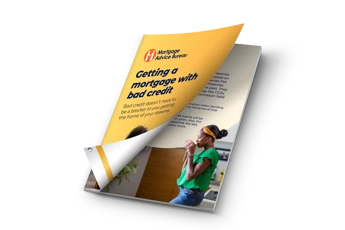 Written by: Danny Belton - Head of Lending
Written by: Danny Belton - Head of Lending
If you’re currently living with debt, then you may be wondering: can I get a mortgage? While having debt can make it trickier to get a mortgage, the most important thing you can do to improve your chances is to work on your credit score, which we talk you through in this article.
In this article:
Your debt isn’t the entire picture
What is classed as a debt for mortgage purposes?
Identify large events that caused the debt
How much debt can I have and still get a mortgage?
How long after clearing debt can I get a mortgage?
Can you remortgage with outstanding debt?
Can you absorb debt into a mortgage?
Improve your chances of getting a mortgage despite your debts
Your debt isn't the entire picture
In April 2024, there was £4,232 total unsecured debt per adult in the UK.1 If this includes you, consider your income and other expenses before you look at your debts. Mortgage lenders look at the big picture of your financial position. If you can afford to repay your agreed debt payments AND have money left over, this could improve your chances of getting approved for a mortgage.
Debt does affect how much you can borrow - there’s no getting around that. However, it helps if you can show affordability for a mortgage by having reduced expenses or a large income with plenty of monthly free capital. Try our affordability calculator to get an overview of how much you could afford whilst still making debt repayments.
What is classed as a debt for mortgage purposes?
Debts can include anything from student loans to outstanding credit card balances. Understanding what lenders consider a debt will help you when it comes to applying for a loan. You may need to spend time paying off these debts to improve your credit score, rather than saving up for your deposit.
Click on the button below to learn more about saving versus paying off debt:
Lenders also differentiate between ‘good debt’ and ‘bad debt’. ‘Good debt’ consists of low-risk loans, such as student loans. ‘Bad debt’ is higher-risk, or more expensive, forms of credit, such as store credit cards or payday loans. Marks on your credit history may also count against you, including CCJs, IVAs, or bankruptcy.
So, which debts do you have and how will they affect your mortgage application?
Student loans
If your student loans are from the Student Loans Company, the loan repayments are taken from your pre-tax salary each month. As this is a government-backed financial scheme, lenders shouldn’t have much of an issue with this type of debt.
If, however, you took out other loans while you were a student, this could affect your eligibility for a larger mortgage. It all depends on how large your student loan was, whether you’ve repaid every monthly payment on time (and in full), and how much time is left on the loan term.
Credit cards
Credit cards aren’t always a red flag - it’s all about how you use them. They can help you build a good credit score, even if you’ve previously had poor credit.
For instance, if you’re always maxed out and only repay the minimum each month, mortgage lenders won’t look kindly on that. However, if you spend up to around 20% of your total borrowing limit2 each month, and then pay it off in full, on time, every month; this shows you’re responsible with credit.
Did you know the average UK household averages around £2,471 of credit card debt?1 Some manage their debt responsibly, and others may struggle to meet their debt payments. If you’re struggling with debt, consider finding help through platforms like Citizens Advice or StepChange.
Car finance
Cars are expensive, and mortgage providers know that. They’re also fully aware that they’re essential for most people to get to and from work – and without a job, you wouldn’t be able to pay your mortgage!
It’s a steady debt to have in order to eventually own something at the end, and it’s in your interest to pay each monthly payment in full and on time. If you can prove to lenders that you are consistently meeting your car finance payments, this should demonstrate that you are capable of managing your debt responsibly.
CCJs and IVAs
A County Court Judgement (CCJ) or Insolvency Voluntary Agreement (IVA) will have a serious impact on your ability to get a mortgage. However, it’s important to note that both CCJs and IVAs are not forms of debt - they are a legal means for creditors to ensure that they’re repaid the money they are owed.
There are very few lenders who will take someone with a recent CCJ or IVA to their name. Unless you have an exceptionally large deposit, it could be difficult to get a mortgage. That being said, it’s not impossible. Speaking to a mortgage broker is the best course of action, as they will be able to tailor your application to lenders who are more accommodating of complex financial needs.
Bankruptcy
A current bankruptcy, and the six years following the declaration, will prevent you from getting a mortgage from almost all lenders.
While it may be difficult, it’s important to stay positive. There are a handful of mortgage providers who will take discharged bankruptcies from as little as one year after the declaration (and it’s important to note that the likelihood of acceptance increases the more time has passed, and that you will be charged a higher level of interest).
A mortgage adviser will have access to unique deals that you may not find if you apply for a mortgage on your own, so it’s well worth taking advantage of their expertise.
Identify large events that caused the debt
Mortgage lenders need to know why you’ve got debt. Some debt, like student loans, are easily recognisable. Meanwhile, others, such as one-off payday loans, need more explanation.
Lenders offer loans on a case-by-case basis. If, for example, you changed jobs and your car broke down before your first new paycheck, that would explain why you needed a short-term loan one time.
However, if your credit and loan history shows a pattern of borrowing from several lines of credit and over a longer period of time, this shows your spending habits aren’t caused by one major factor. Lenders are less likely to look favourably on these types of habits.
How much debt can I have and still get a mortgage?
The lender uses a method known as a ‘debt-to-income ratio’ (DTI) which divides your monthly debt payments by your gross monthly income, to determine whether you can still get a mortgage.
For example, if your monthly income is £2,000 and your monthly debt repayments are £500, your DTI ratio would be 25% (500 ÷ £2,000 x 100).
Lenders have different thresholds for their debt-to-income ratios, but generally speaking, the lower your DTI, the more confident a lender will be to loan you the money. If you have a high DTI, this doesn’t necessarily mean you can’t still get a mortgage, but you may have to pay a higher interest rate to the lender to compensate for the risk they are taking.
How long after clearing debt can I get a mortgage?
There is no set time limit on when you can get a mortgage after paying off your debts. As long as you meet the lender's affordability requirements, such as credit score, DTI ratio, deposit amount etc., then the amount of time that has passed since you cleared your debt becomes less important.
Can you remortgage with outstanding debt?
Like your first mortgage application, the lender will look at your whole financial position and see if you meet their requirements before approving you for a remortgage. This includes working out your DTI ratio, looking at your credit score, and your current LTV. These all contribute to assessing your overall affordability.
Can you absorb debt into a mortgage?
Some homeowners decide to take out a new mortgage and borrow more money in order to pay off outstanding debts. This is also known as ‘debt consolidation.’ Whilst this can be easier to manage as the debt is all in one place rather than spread across multiple accounts, you need to be careful that you don’t end up paying more money, as a mortgage is often a much longer investment and the risk is now tied up against your home.
You need to make sure that you can afford the increased payments, as using your mortgage as a debt consolidation plan can come with risks.
Speak to a professional mortgage adviser so that you can make an informed decision and find a mortgage that is right for you. To work out your potential mortgage repayments, try out our repayment calculator.
Improve your chances of getting a mortgage despite your debts
You can rebuild your credit score to improve your chances of getting a mortgage, but timescales may differ. Take these steps first:
Check your credit score
Your credit rating is something that all lenders will consider when you apply for a mortgage. Make sure you spot any defaults, potential fraud against your name, or other stumbling blocks by checking your credit score.
Different lenders use different credit score companies to determine your suitability for a mortgage. Make sure you get your free credit report from all three major credit bureaus:
If your score is low but you don’t know why, reach out to your credit score company and see if you can get a more detailed report. Some of these may be behind a subscription, but it may be worth it for you if you need more support - even if it’s just for a few months.
Don’t miss any repayments
Defaults can take a long time to stop affecting your credit report.
Any missed payment, known as defaults, on any line of credit will affect your credit score. Even if you’ve only got £1 on your credit card and you forget to repay it, that’ll look like a late payment or a default. If you believe you’re going to start missing repayments, get in touch with your lender.
Avoid applying for credit soon before your mortgage application
Every application for credit knocks your credit score down for a little while – and if you’re rejected, that has an even bigger impact on your long-term rating.
Applying for credit a few months before your mortgage application can seem like a red flag to lenders. It looks like you can’t afford to live within your means, and this could make you a high risk borrower. If you can avoid it, don’t apply for any credit at least six months before your mortgage application.
Get expert mortgage advice
A mortgage adviser can offer advice and tips to help you improve your credit score and other factors that may affect your mortgage eligibility. They know the industry inside out, and will be able to tell you if your application is likely to be accepted, or if waiting a few months or a year would be better.
Our advisers are happy to help guide you through the mortgage process, talking through your options if you are currently in debt. Get in touch for a free, initial, no obligation consultation.
Speak to an expert mortgage adviser
Frequently asked questions
Debt can impact your mortgage eligibility by influencing how much you can borrow and your overall creditworthiness. Lenders assess your ability to manage debt responsibly and consider your income, expenses, and debt repayment history.
Mortgage lenders consider various types of debt, including student loans, credit card debt, car finance, mobile phone contracts, County Court Judgements (CCJs), Individual Voluntary Arrangements (IVAs), and bankruptcy.
Government-backed student loans are generally not viewed negatively by mortgage lenders as repayments are automatically deducted from your pre-tax salary.
Responsible credit card use can improve your credit score. Lenders look favorably on applicants who use a small percentage of their credit limit and pay off their balance on time each month. Maxing out credit cards and making only minimum payments can negatively impact your mortgage application.
Car finance is generally viewed as a manageable debt if you consistently make your payments on time. Demonstrating your ability to handle this debt responsibly can positively influence your mortgage eligibility.
Having a recent CCJ or IVA can significantly reduce your chances of getting a mortgage. Few lenders are willing to approve applicants with these financial issues unless you have a substantial deposit. Consulting one of our mortgage advisers can help identify specialist lenders that are more accommodating to complex financial situations.
Bankruptcy can severely limit your ability to obtain a mortgage, especially within the six years following the declaration. However, some lenders may consider applicants with discharged bankruptcies after one year, albeit at higher interest rates. Working with a mortgage adviser can help you find suitable options.
To improve your chances, check and improve your credit score, avoid missing repayments, and refrain from applying for new credit before your mortgage application. Consulting a mortgage adviser for personalised advice can also be beneficial.
Important information
Your home may be repossessed if you do not keep up repayments on your mortgage.
There may be a fee for mortgage advice. The actual amount you pay will depend on your circumstances. The fee is up to 1% but a typical fee is 0.3% of the amount borrowed.
Related Articles
Understanding your credit score
If you were in a position where someone was asking you for a large amount of money, you’d want to know they were in a good place to pay it back, right? That’s the position the lenders are in.
650 views | 2 years ago
What is a mortgage guarantor?
Being a mortgage guarantor is an excellent way to help someone who might otherwise struggle to get approved for a mortgage.
710 views | 2 years ago
Getting a mortgage with bad credit
A credit score is a measure of your financial health. We’ve pulled together a handy guide to help you improve your credit score to strengthen your chances when you sit down with an adviser.
< 10 views | 1 day ago
No posts currently available




